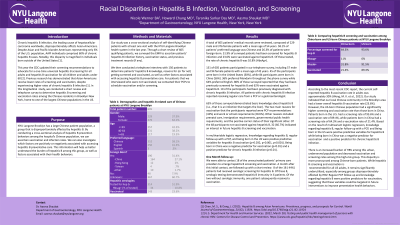Tuesday Poster Session
Category: Liver
P3864 - Racial Disparities in Hepatitis B Infection, Vaccination, and Screening
Tuesday, October 24, 2023
10:30 AM - 4:00 PM PT
Location: Exhibit Hall

Has Audio

Nicole Werner, BA
NYU Langone Health
New York, NY
Presenting Author(s)
Nicole Werner, BA1, Howard Chung, MD1, Taranika Sarkar Das, MD2, Aasma Shaukat, MD1
1NYU Langone Health, New York, NY; 2NYU Langone Health, Brooklyn, NY
Introduction: Chronic hepatitis B infection, the leading cause of HCC worldwide, disproportionately affects Asian-Americans, particularly those born outside of the U.S. Our study assessed hepatitis B screening and vaccination rates among Chinese patients at NYU Langone Health Brooklyn outpatient clinics.
Methods: The study consisted of self-identifying Chinese patients with at least one visit with the NYU Brooklyn health system in the past year. Through chart review followed by a telephone survey, we ascertained rates of hepatitis B screening, vaccination, and investigated factors associated with accessing hepatitis B preventative care. For participating patients, we contacted PCPs to schedule vaccination.
Results: Of 605 Chinese patients included at NYU Langone Health Brooklyn, 51.9% had been screened for hepatitis B infection and 23.5% were vaccinated against hepatitis B. Of those tested, the rate of chronic hepatitis B was 10.8% (Hbsag+). Being born in the United States was a positive predictor for vaccination (p< 0.01), while being born in China was a negative predictor for vaccination (p< 0.01) and positive predictor for chronic hepatitis B infection (p< 0.01).
Of 151 patients participating in our telephone survey, knowledge regarding hepatitis B and regular follow up with a PCP were positive predictive variables for vaccination (p=0.02 and p=0.001). Of the 48 participants not vaccinated against hepatitis B, 32 indicated interest in screening and vaccination (66.7%). We were able to contact 18 of these patients’ PCPs to initiate screening and vaccination. One month after this initial contact, we followed up with the PCPs and learned that eight of the 18 patients had been screened for hepatitis B (44.4%). Of these eight, serologic testing demonstrated immunity in six patients (75%). Of the two without serologic immunity, one patient subsequently received vaccination.
Discussion: There is an increased burden of HBV among this urban, underserved population and decreased rates of vaccination and screening among this high-risk group. This disparity is more pronounced among Chinese-born patients. While hepatitis B screening and vaccination is recommended for all U.S. adults, it remains significantly underutilized, especially among groups that are disproportionately affected by HBV. Regular PCP follow up and knowledge regarding hepatitis B were positive predictors for vaccination, suggesting that these variables could be targeted in future interventions aiming to improve preventative health behaviors.
Disclosures:
Nicole Werner, BA1, Howard Chung, MD1, Taranika Sarkar Das, MD2, Aasma Shaukat, MD1. P3864 - Racial Disparities in Hepatitis B Infection, Vaccination, and Screening, ACG 2023 Annual Scientific Meeting Abstracts. Vancouver, BC, Canada: American College of Gastroenterology.
1NYU Langone Health, New York, NY; 2NYU Langone Health, Brooklyn, NY
Introduction: Chronic hepatitis B infection, the leading cause of HCC worldwide, disproportionately affects Asian-Americans, particularly those born outside of the U.S. Our study assessed hepatitis B screening and vaccination rates among Chinese patients at NYU Langone Health Brooklyn outpatient clinics.
Methods: The study consisted of self-identifying Chinese patients with at least one visit with the NYU Brooklyn health system in the past year. Through chart review followed by a telephone survey, we ascertained rates of hepatitis B screening, vaccination, and investigated factors associated with accessing hepatitis B preventative care. For participating patients, we contacted PCPs to schedule vaccination.
Results: Of 605 Chinese patients included at NYU Langone Health Brooklyn, 51.9% had been screened for hepatitis B infection and 23.5% were vaccinated against hepatitis B. Of those tested, the rate of chronic hepatitis B was 10.8% (Hbsag+). Being born in the United States was a positive predictor for vaccination (p< 0.01), while being born in China was a negative predictor for vaccination (p< 0.01) and positive predictor for chronic hepatitis B infection (p< 0.01).
Of 151 patients participating in our telephone survey, knowledge regarding hepatitis B and regular follow up with a PCP were positive predictive variables for vaccination (p=0.02 and p=0.001). Of the 48 participants not vaccinated against hepatitis B, 32 indicated interest in screening and vaccination (66.7%). We were able to contact 18 of these patients’ PCPs to initiate screening and vaccination. One month after this initial contact, we followed up with the PCPs and learned that eight of the 18 patients had been screened for hepatitis B (44.4%). Of these eight, serologic testing demonstrated immunity in six patients (75%). Of the two without serologic immunity, one patient subsequently received vaccination.
Discussion: There is an increased burden of HBV among this urban, underserved population and decreased rates of vaccination and screening among this high-risk group. This disparity is more pronounced among Chinese-born patients. While hepatitis B screening and vaccination is recommended for all U.S. adults, it remains significantly underutilized, especially among groups that are disproportionately affected by HBV. Regular PCP follow up and knowledge regarding hepatitis B were positive predictors for vaccination, suggesting that these variables could be targeted in future interventions aiming to improve preventative health behaviors.
Disclosures:
Nicole Werner indicated no relevant financial relationships.
Howard Chung indicated no relevant financial relationships.
Taranika Sarkar Das indicated no relevant financial relationships.
Aasma Shaukat indicated no relevant financial relationships.
Nicole Werner, BA1, Howard Chung, MD1, Taranika Sarkar Das, MD2, Aasma Shaukat, MD1. P3864 - Racial Disparities in Hepatitis B Infection, Vaccination, and Screening, ACG 2023 Annual Scientific Meeting Abstracts. Vancouver, BC, Canada: American College of Gastroenterology.
